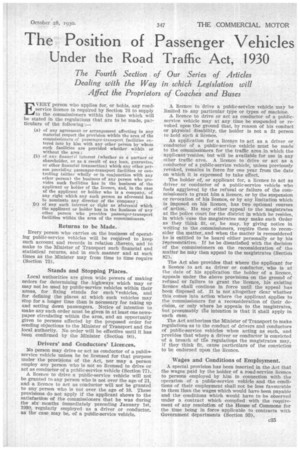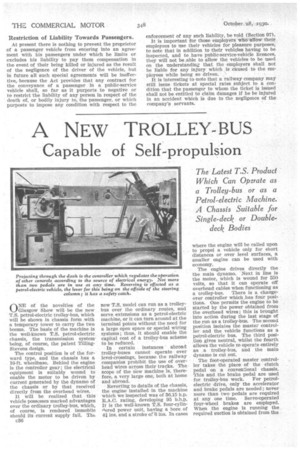The Position of Passenger Vehicles
Page 93

Page 94

If you've noticed an error in this article please click here to report it so we can fix it.
Under the Road Traffic Act, 1930
The Fourth Section of Our Series of Articles Dealing with the Way in which Legislation will Affect the Proprietors of Coaches and Buses
EVERY person who applies for, or holds, any roadservice licence is required by Section 76 to supply to the commissioners within the time which will be stated in the regulations that are to be made, particulars of the following:—
,(a) of any agreement or arrangement affecting in any material respect the provision within the area of the commissioners of passenger-transport facilities entered into by him with any other person by whom such facilities are provided whether within or without the area ; ,(b) of any financial interest (whether as a partner or shareholder, or as a result of any loan, guarantee, or other financial transaction) which any other person providing passenger-transport facilities or controlling (either wholly or in conjunction with any other person) the business of any person who provides such facilities has in the business of the applicant or holder of the licence, and, in the case of the applicant or holder who is a company, of any right which any such person as aforesaid has to nominate any director of the company ; of any such interest or right as aforesaid which the applicant or holder has in the business of any other person who provides passenger-transport facilities within the area of the commissioners.
:(c)
Returns to be Made.
Every person who carries on the business of operating public-service vehicles will be required to keep such account and records in relation thereto, and to make to the Minister of Transport such financial and statistical returns, and in such manner and at such times as the Minister may from time to time require (Section 75).
Stands and Stopping Places.
Local authorities are given wide powers of making orders for determining the highways which may or may not be used by public-service vehicles within their areas, for fixing stands for such vehicles, and for defining the places at which such vehicles may stop for a• longer time than is necessary for taking up and setting down passengers. Notice of intention to make any such order must be given in at least one newspaper circulating within the area, and an opportunity given to persons affected by the proposed order for sending objections to the Minister of Transport and the local authority. No order will be effective until it has been confirmed by the Minister (Section 90).
Drivers' and Conductors' Licences.
No person may drive or act as conductor of a publiaservice vehicle unless he be licensed for that purpose under the provisions of the Act, nor may a person employ any person who is not so licensed to drive or act as conductor of a public-service vehicle (Section 77).
A licence to drive a public-service vehicle will not be granted to any person who is not over the age of 21, and a licence to act as conductor will not be granted to any person who is not over the age of 18. These provisions do not apply if the applicant shows to the satisfaction of the commissioners that he was during the six months immediately preceding Sanuary 1st, 1930, regularly employed as a driver or conductor, as the case may be, of a public-service vehicle.
A licence to drive a public-service vehicle may be limited to any particular type or types of machine.
A licence to drive or act as conductor of a publicservice vehicle may at any time be suspended or revoked upon the ground that, by reason of his conduct or physical disability, the holder is not a fit person to hold such a licence.
An application for a licence to act as a driver or -conductor of a public-service vehicle must be made to the commissioners for the traffic area in which the applicant, resides, but will be available for use in any other traffic area. A licence to drive or act as a conductor of a public-service vehicle, unless previously revoked, remains in force for one year from the date on which it is expressed to take effect.
The holder of, or applicant for, a licence to act as driver or conductor of a public-service vehicle who feels aggrieved by the refusal or failure of the commissioners to grant him a licence, or by the suspension or revocation of his licence, or by any limitation which is imposed on his licence, has two optional courses of action. He may either appeal to the magistrates at the police court for the district in which he resides, , in which case the magistrates may make such Order as they think fit, or, he may, by giving notice in writing to the .commissioners, require them to reconsider the matter,.and when the matter is reconsidered he is entitled to be heard either personally or by his representative. If he be dissatisfied with the decision of the commissioners on the reconsideration of the matter he may then appeal to the magistrates (Section 82).
The Act also provides that where the applicant for a licence to act as driver or conductor, who is at the date of his application the holder of a licence, appeals under the above provisions on the ground of refusal or failure to grant the licence, his existing licence shall continue in force until the appeal has been disposed of. It is not altogether clear whether this comes into action where the applicant applies to the commissioners for a reconsideration of their decision, or only where he appeals to the magistrates, but presumably the intention is that it shall apply in each case.
The Act authorizes the Minister of Transport to make regulations as to the conduct of drivers and conductors of public-service vehicles when acting as such, and provides that where a driver or conductor is convicted of a breach of tile regulations the magistrates may, if they think fit, cause particulars of the conviction to be endorsed upon the licence.
Wages and Conditions of Employment.
A special provision has been inserted in the Act that the wages paid by the holder of a road-service licence to persons employed by him in connection with the operation of a public-service vehicle and the conditions of their employment shall not be less favourable to them than the wages which would have been payable and the conditions which would have to be observed under a contract which complied with the requirPmeat of any resolution of the House of Commons for the time being in force applicable to contracts with Government departments (Section 03). Restriction of Liability Towards Passengers.
At present there is nothing to prevent the proprietor of a passenger vehicle from entering into an agreement with his passengers under which he limits or excludes his liability to pay them compensation in the event of their being killed or injured as the result of the negligence of the driver of the vehicle, hut in future all such special agreements will be ineffective, because the Act provides that any contract for the conveyance of a passenger in a public-service vehicle shall, so far as it purports to negative or to restrict the liability of any person in respect of the death of, or bodily injury to, the passenger, or which purposts to impose any condition with respect to the enforcement of any such liability, be void (Section 07).
It is important for those employers who allow their employees to use their vehicles for pleasure purposes, to note that In addition to their vehicles having to be inspected, and to have public-service-vehicle licences, they will not be ,able to allow the vehicles to be used on the understanding that the employers shall not be liable for any injury which is caused to the employees while being so driven.
It is interesting to note that a railway company may still issue tickets at special rates subject to a condition that the passenger to whom the ticket is issued shall not be entitled to claim damages if he be injured in an accident which is due to the negligence of the company's servants.




















































































































































































